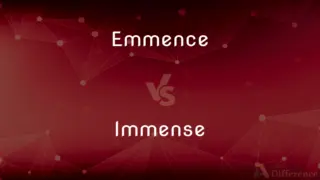Waitor vs. Waiter — Which is Correct Spelling?
Edited by Tayyaba Rehman — By Fiza Rafique — Updated on March 26, 2024
"Waitor" is incorrect. The correct spelling is "Waiter," referring to a person who serves food and drinks in a restaurant.

Table of Contents
Which is correct: Waitor or Waiter
How to spell Waiter?

Waitor
Incorrect Spelling

Waiter
Correct Spelling
ADVERTISEMENT
Key Differences
Consider the common phrase: "water for the waiter" – both end in "er."
Think of "waiter" as someone who "waits" and then adds the “er” suffix.
Remember it has the word “wait” with the “er” ending, not "or."
Recall that a "waiter" waits on tables.
Relate it to other professions like "baker" or "painter" that also end in "er."
ADVERTISEMENT
How Do You Spell Waiter Correctly?
Incorrect: The waitor was very attentive during our meal.
Correct: The waiter was very attentive during our meal.
Incorrect: The waitor recommended a delicious wine.
Correct: The waiter recommended a delicious wine.
Incorrect: Our waitor brought out a free dessert for my birthday.
Correct: Our waiter brought out a free dessert for my birthday.
Incorrect: We left a big tip because the waitor was excellent.
Correct: We left a big tip because the waiter was excellent.
Incorrect: Can you call the waitor over for the bill?
Correct: Can you call the waiter over for the bill?
Waiter Definitions
A small tray or salver.
She placed the tea cup on a silver waiter.
A person who waits or is waiting.
As a waiter for the bus, he read a book.
An attendant in Britain who serves customers in various capacities.
The waiter at the hotel showed us to our room.
A person who attends to customers in a dining establishment.
The waiter brought our drinks quickly.
An employee who serves or assists customers.
The store had a waiter to help with selections.
One who serves at a table, as in a restaurant.
A tray or salver.
A male or female attendant who serves customers at their tables in a restaurant, café or similar.
Waiter! There's a fly in my soup.
Someone who waits for somebody or something; a person who is waiting.
(historical) A person working as an attendant at the London Stock Exchange.
(obsolete) A vessel or tray on which something is carried, as dishes, etc.; a salver. (See etymology of dumbwaiter.)
(obsolete) A custom house officer; a tide waiter.
(obsolete) A watchman.
(stative) To work as a waiter.
One who, or that which, waits; an attendant; a servant in attendance, esp. at table.
The waiters stand in ranks; the yeomen cry,"Make room," as if a duke were passing by.
A vessel or tray on which something is carried, as dishes, etc.; a salver.
A person whose occupation is to serve at table (as in a restaurant)
A person who waits or awaits
Waiter Meaning in a Sentence
She has been working as a waiter for five years.
When we needed more water, the waiter promptly refilled our glasses.
Our waiter was so friendly and made great menu suggestions.
The waiter took our order as soon as we were ready.
He dropped a fork, and the waiter replaced it immediately.
She noticed we were celebrating and asked the waiter for a surprise dessert.
The waiter was very patient with our indecisive friend.
He aspires to be a head waiter at a fine dining restaurant.
Our waiter checked on us throughout the meal to ensure we were satisfied.
She was a waiter during college and learned valuable customer service skills.
The waiter explained the specials of the day in detail.
The waiter split the bill for us without any hassle.
Our waiter was quick to clean up the spill and apologized profusely.
The waiter managed to balance so many plates at once.
Our waiter made sure the food met our dietary restrictions.
The waiter made a great impression on us with his professionalism and courtesy.
He received an award for being the best waiter in the restaurant.
She said becoming a waiter improved her communication skills.
Common Curiosities
What is the root word of Waiter?
The root word is "wait."
Which vowel is used before Waiter?
The vowel "a."
Why is it called Waiter?
It is called "waiter" as it derives from the verb "wait," referring to someone who waits on or serves customers.
Is Waiter a noun or adjective?
"Waiter" is primarily a noun.
What is the pronunciation of Waiter?
/ˈweɪ.tər/
What is the singular form of Waiter?
"Waiter."
Which preposition is used with Waiter?
Prepositions like "for," "by," and "with" can be used.
Which conjunction is used with Waiter?
Standard conjunctions like "and" or "or" can be used.
What is the verb form of Waiter?
The verb form is "wait."
Is Waiter a negative or positive word?
Neutral.
What is the plural form of Waiter?
"Waiters."
Which article is used with Waiter?
Both "a" and "the" can be used, depending on the context.
Is Waiter an abstract noun?
No.
Is Waiter a countable noun?
Yes.
Is the word “Waiter” a Direct object or an Indirect object?
"Waiter" can function as a direct object, depending on the sentence structure.
How many syllables are in Waiter?
Two.
What is another term for Waiter?
Server.
Is Waiter an adverb?
No.
Is Waiter a collective noun?
No.
How do we divide Waiter into syllables?
Wait-er.
Which determiner is used with Waiter?
Determiners like "a," "an," or "the" can be used.
What is the second form of Waiter?
There isn't a "second form" for nouns. If referring to verbs, the second form is "waited."
How is Waiter used in a sentence?
"The waiter took our order and returned with our drinks shortly after."
Is Waiter a vowel or consonant?
"Waiter" is a word, consisting of both vowels and consonants.
Is the Waiter term a metaphor?
No, but it can be used metaphorically in some contexts.
Is the word Waiter imperative?
No.
Is the word Waiter a gerund?
No.
What is a stressed syllable in Waiter?
The first syllable, "Wait."
What is the first form of Waiter?
Waiter.
What is the third form of Waiter?
Again, there isn't a "third form" for nouns. If referring to verbs, the third form is "waited."
What part of speech is Waiter?
Noun.
What is the opposite of Waiter?
Customer or patron.
Share Your Discovery

Previous Comparison
Physiqe vs. Physique
Next Comparison
Emmence vs. ImmenseAuthor Spotlight
Written by
Fiza RafiqueFiza Rafique is a skilled content writer at AskDifference.com, where she meticulously refines and enhances written pieces. Drawing from her vast editorial expertise, Fiza ensures clarity, accuracy, and precision in every article. Passionate about language, she continually seeks to elevate the quality of content for readers worldwide.
Edited by
Tayyaba RehmanTayyaba Rehman is a distinguished writer, currently serving as a primary contributor to askdifference.com. As a researcher in semantics and etymology, Tayyaba's passion for the complexity of languages and their distinctions has found a perfect home on the platform. Tayyaba delves into the intricacies of language, distinguishing between commonly confused words and phrases, thereby providing clarity for readers worldwide.


































